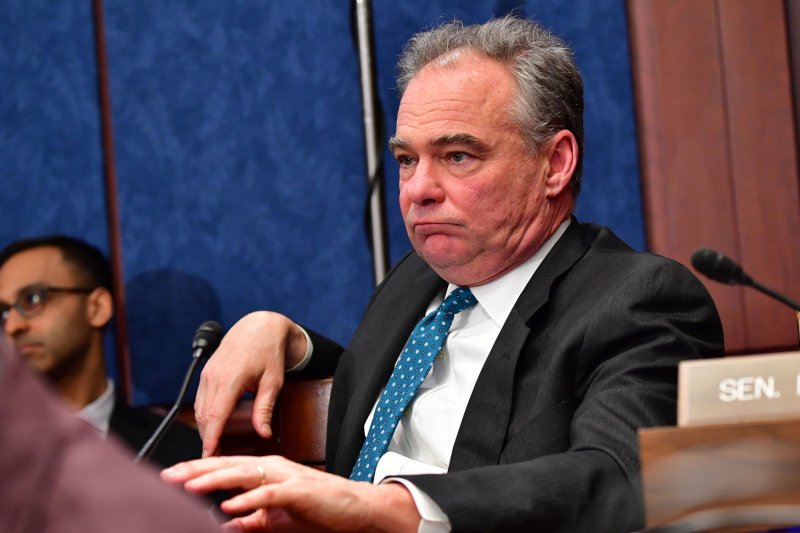Sen. Tim Kaine, D-Va., is holding up a State Department nominee over the U.S. airstrike on Syria in April 2017 -- a purely political move, as Kaine actually favors the nominee. File Photo by Kevin Dietsch/UPI |
License Photo
Dec. 19 (UPI) -- The last presidential election created a shift in political discourse in the United States. Initially, Hillary Clinton mocked Donald Trump and the latter retaliated fiercely. This interaction took a snowball effect and created a trend in today's politics.
The political discourse in the United States has reached an unprecedented low. It has lost all civility and respect. In addition to the deteriorating discourse, politicians now are acting with so much entitlement. Somehow politicians in the United States are acting as if they "own" their positions, where in fact they were elected by their constituencies to "serve" in these positions.
When I see Trump threatening to shut down the government if he does not get $5 billion in funding for his wall, and when I see Sen. Tim Kaine holding a position that badly needs to be filled because he did not get a response on a memo from the White House, I think of the Lebanese politics. I think of the head of the parliament Nabih Berri, who shut down the parliament for almost two years and kept the country in a state of chaos without a president just because the rival bloc did not get agree to his demands.
However, this is the Arab world. The person is the state and the state is the person. The elected official looks at the elections as a power of attorney from the people and thinks he is entitled to do whatever he wants. However, in developed countries, elected officials are not supposed have this sense of entitlement.
Looking at American politics, one realizes that officials are acting with this same destructive sense of entitlement. Today, in foreign policy, the hottest spot is Syria. The State Department does not have an assistant secretary for near-east affairs. The nominee has not been confirmed because Kaine has asked the administration for a memo explaining the legal base for the attack on the Sharyat airfield in Syria in April 2017. Kaine's argument is that the Trump administration did not give him the adequate legal justification for conducting such an attack. He explains that the American people need to know on which basis wars and military attacks are being conducted.
Kaine's excuse is lame, as it is obvious that Syrian President Bashar al-Assad broke the red line by using chemical weapon on the civilian population, killing at least 89 people, including 33 children. However, this excuse that Kaine takes against Trump is actually hindering the flow of American policy at a time the United States badly needs a consistent comprehensive and coherent policy in Syria.
The irony is that Kaine is happy with the nominee. The nominee is David Schenker, an expert on the Middle East who has served for a long time in the Pentagon and has earned respect and appreciation in Middle East policy circles. Despite the fact he thinks Schenker is the right person for the job, Kaine is willing to keep position vacant and stall the policy process just to score a point on the Trump administration.
The problem today is that partisanship is changing the face of politics. It is like the mad cow disease. Politicians are becoming vicious and angry. The number one priority is not to serve those who elected them and to work for the national interest of the country but to destroy the opponent. The confrontation in American politics has reached its height. This adversarial drive has overshadowed the essence of good governance. The politicians have lost all sense of compromise and risk to put the country in a state of deadlock.
The situation of Trump-Kaine-Schenker is an example on how partisanship can drive the country down the drain. Politicians are failing to see the big picture and each one is held hostage in his little partisan cocoon. Democracy is built on compromise. Even if the majority wins, it still needs to take into consideration the rights and the aspirations of the minority. This does not seem to be the prevalent mood today in the United States. The mood is to destroy the rival and to have it all one's way.
This is a dangerous trend and U.S. politics desperately needs some civility and manners. Politicians need to learn how to behave as statesmen before behaving as partisans. Even Trump, as belligerent as he comes across, in an interview with Sinclair media expressed regrets for using an aggressive attitude with his opponents in his first two years in office. He said he should have used a softer, more conciliatory tone with the Democrats for the sake of the country.
The past elections were described as divisive. Their danger is that those divisions along partisan line, if they persist, risk tearing the country apart.
Dania Koleilat Khatib is executive director of the Al Istishari Al Strategy Center for Economic and Future Studies, a UAE-based independent think tank. She specializes in U.S.-Arab relations and researches sectarianism, extremism and governance. Her book "The Arab Lobby and the U.S.: Factors for Success and Failure" was published by Routledge UK and translated to Arabic.















